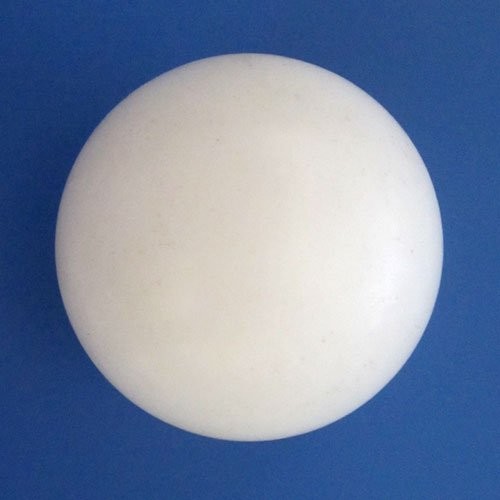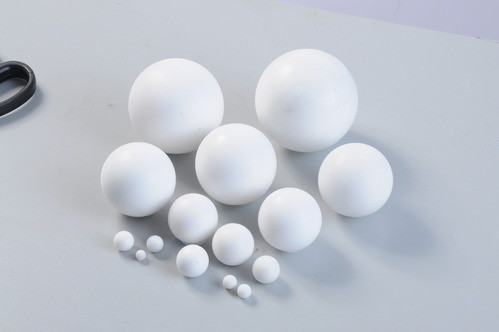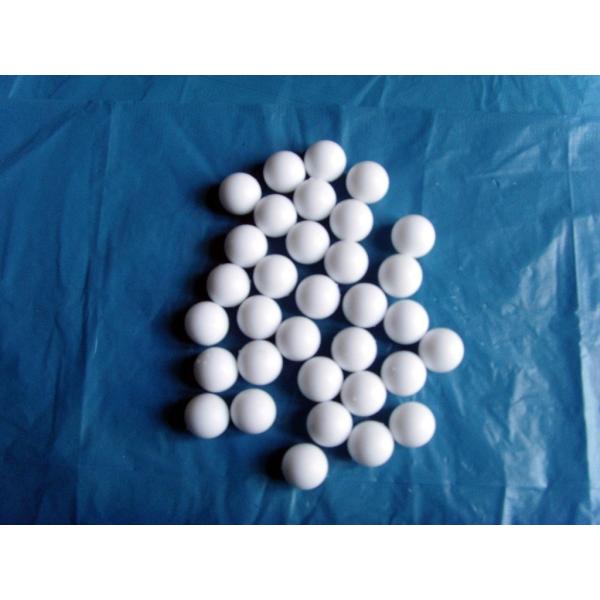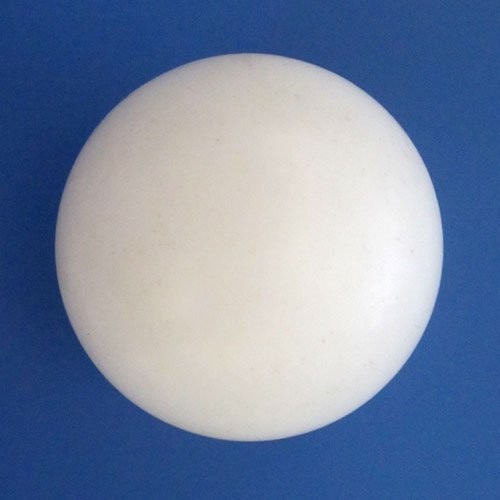PTFE balls, also known as Teflon balls, are spherical components made from polytetrafluoroethylene, a high-performance fluoropolymer. These balls are widely used in various industries due to their exceptional properties, including high chemical resistance, low friction, non-stick characteristics, and excellent thermal stability. They are commonly applied in valves, bearings, pumps, and other mechanical systems where reliable performance under harsh conditions is essential.
| Parameter | Specification | Testing Standard |
|---|---|---|
| Material | Pure PTFE (Polytetrafluoroethylene) | ASTM D1710 |
| Density | 2.14 - 2.20 g/cm³ | ASTM D792 |
| Hardness | 50 - 65 Shore D | ASTM D2240 |
| Tensile Strength | 20 - 35 MPa | ASTM D638 |
| Elongation at Break | 200 - 400% | ASTM D638 |
| Coefficient of Friction | 0.05 - 0.10 (static/dynamic) | ASTM D1894 |
| Maximum Service Temperature | 260°C (500°F) | ASTM D794 |
| Minimum Service Temperature | -200°C (-328°F) | ASTM D746 |
| Thermal Conductivity | 0.25 W/m·K | ASTM C177 |
| Dielectric Strength | 19 kV/mm | ASTM D149 |
| Diameter Range | Tolerance | Available Grades | Surface Finish |
|---|---|---|---|
| 1 mm - 50 mm | ±0.05 mm to ±0.25 mm | Virgin, Glass Filled, Carbon Filled, Bronze Filled | Standard, Precision, High Gloss |
| 50 mm - 100 mm | ±0.25 mm to ±0.50 mm | Virgin, Glass Filled, Carbon Filled | Standard, Precision |
| 100 mm - 200 mm | ±0.50 mm to ±1.00 mm | Virgin, Glass Filled | Standard |
| Chemical Type | Resistance Rating | Maximum Concentration | Temperature Limit |
|---|---|---|---|
| Strong Acids | Excellent | Concentrated | 260°C |
| Strong Bases | Excellent | Concentrated | 260°C |
| Organic Solvents | Excellent | 100% | 260°C |
| Oils and Greases | Excellent | 100% | 260°C |
| Salt Solutions | Excellent | Saturated | 260°C |
| Material | Chemical Resistance | Temperature Range | Coefficient of Friction | Cost Comparison |
|---|---|---|---|---|
| PTFE | Excellent | -200°C to +260°C | 0.05 - 0.10 | Medium |
| Nylon | Good | -40°C to +120°C | 0.15 - 0.25 | Low |
| Acetal | Good | -40°C to +100°C | 0.10 - 0.20 | Low |
| Stainless Steel | Very Good | -270°C to +700°C | 0.30 - 0.60 | High |
| Ceramic | Excellent | -200°C to +1400°C | 0.10 - 0.20 | Very High |
What is the maximum operating temperature for PTFE balls?
PTFE balls can typically operate continuously at temperatures up to 260°C (500°F). For short-term exposure, they can withstand temperatures up to 300°C (572°F) without significant degradation. At extremely low temperatures, PTFE remains functional down to -200°C (-328°F), making it suitable for cryogenic applications.
Are PTFE balls suitable for food contact applications?
Yes, pure PTFE balls are FDA compliant and suitable for food contact applications. They are non-toxic, non-contaminating, and meet the requirements for use in food processing equipment, packaging machinery, and beverage dispensing systems. Always ensure you're using virgin PTFE material without any fillers for food-grade applications.
How do filled PTFE balls differ from virgin PTFE balls?
Filled PTFE balls contain additives that enhance specific properties. Glass-filled PTFE offers improved wear resistance and reduced deformation under load. Carbon-filled PTFE provides better conductivity and increased stiffness. Bronze-filled PTFE offers superior thermal conductivity and improved wear characteristics. Virgin PTFE provides the highest chemical purity and best non-stick properties.
What are the limitations of PTFE balls?
While PTFE balls offer excellent chemical resistance and low friction, they have some limitations. They have relatively low mechanical strength compared to metal balls, are susceptible to creep under continuous load, and have poor radiation resistance. Additionally, they cannot be used with molten alkali metals or certain fluorine compounds at high temperatures.
How should PTFE balls be stored and handled?
PTFE balls should be stored in a cool, dry place away from direct sunlight and heat sources. They should be kept in their original packaging until use to prevent contamination. When handling, use clean gloves to avoid transferring oils or dirt to the surface. Avoid sharp objects that could scratch or damage the balls.
Can PTFE balls be customized for specific applications?
Yes, PTFE balls can be customized in terms of size, tolerance, surface finish, and material composition. Special sizes outside standard ranges can be manufactured, and different filler materials can be incorporated to meet specific performance requirements. Custom colors and special packaging are also available for particular applications.
What maintenance is required for PTFE balls in mechanical systems?
PTFE balls generally require minimal maintenance due to their self-lubricating properties and wear resistance. Regular inspection for surface damage or excessive wear is recommended. In high-load applications, periodic replacement may be necessary depending on operating conditions. Clean with isopropyl alcohol or mild detergents when contamination occurs.
Are there any safety considerations when using PTFE balls?
PTFE is generally safe to handle at normal operating temperatures. However, when heated above 300°C (572°F), PTFE can decompose and release toxic fumes. Always ensure proper ventilation when using PTFE balls in high-temperature applications. Follow manufacturer guidelines for temperature limits and application-specific safety recommendations.
How do I select the right PTFE ball for my application?
Selection depends on several factors including operating temperature, chemical environment, load requirements, and desired service life. Consider the chemical compatibility with your media, the mechanical loads involved, temperature ranges, and any regulatory requirements. Consulting with technical specialists can help determine the optimal PTFE ball specification for your specific application needs.
What is the typical lead time for custom PTFE ball orders?
Lead times vary depending on the complexity and quantity of the order. Standard sizes are typically available from stock or within 2-4 weeks. Custom sizes and special formulations may require 6-8 weeks for production. Rush orders can often be accommodated with additional expediting fees and reduced lead times.
| Package Type | Quantity Range | Special Features | Applications |
|---|---|---|---|
| Bulk Packaging | 100 - 10,000 units | Cost-effective, standard protection | Industrial, manufacturing |
| Individual Blister Packs | 1 - 100 units | Maximum protection, easy identification | Laboratory, medical, precision applications |
| Reel Packaging | 500 - 5,000 units | Automated handling, consistent orientation | High-volume assembly lines |
| Custom Packaging | Any quantity | Branded, specialized requirements | OEM, specialized industries |




